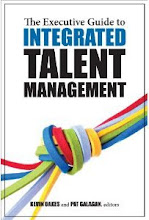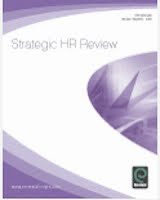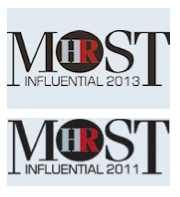 The latest 'Why we Hate HR' rant has been run by the FT today.
The latest 'Why we Hate HR' rant has been run by the FT today.
Private equity boss, Luke Johnson, criticises HR as a 'necessary evil', 'a simple expense, and a burden on the backs of productive workers'.
I don't think Johnson provides a very powerful or coherent argument, and its noticeable that he only seems to see HR's role in connection to employee problems (something to do with his own management style perhaps?).
Anyway, I've recently had my own rant on 'Why hate Private Equity' so I guess this makes us even.
I'm more concerned about the comments made about the article, most of which support Johnson's perspective on HR.
Perhaps we do need more promotion along the lines of SHRM's new ad after all.
More about me:
@joningham, http://linkedin.com/in/joningham
info@joningham.com, +44 7904 185134
Top 100 HR Tech Influencer - Human Resources Executive
HRD Thought Leader - HRD Connect
Mover and Shaker - HR magazine
Also develop your Strategic HCM capabilities at my new Strategic HR Academy





























This FT article is just another reminder of the challanges HR faces to win over hearts and minds of those they serve.
ReplyDeleteIt seems HR will always be characterized by the "negative" aspects of its role such as discipline and ensuring the adherance to company policies.
Makes me wonder when HR will ever be given the respect it is due for its effort to develop and improve an organization's most important assets - its people.
Chris Young
The Rainmaker Group
Thanks for your comment, Chris.
ReplyDeleteI think in some organisations it already is, we just need to make that the case more consistently...
I hope you're enjoying the blog.
Also see http://www.managementtoday.co.uk/newsalerts/article/781762/mtsweek/hands-hate-hr/?DCMP=EMC-Daily%20News :
ReplyDeleteApparently three quarters of us now think HR is either a complete waste of space, or positively harmful...
An employee satisfaction survey by HR services group Ceridian found that satisfaction with the HR department is plumbing new depths. Half of those surveyed said HR made no difference whatsoever to their jobs, while another 22% went as far as to say that it actually had a negative impact.
And it’s not as though these employees are lacking HR support – 96% said their company had a fully-fledged team. It’s just that most of them don’t think the department is making any kind of useful contribution. As Ceridian’s UK MD Doug Sawers says, the report ‘makes grim reading for the HR function’.
Dissatisfaction was particularly common among male office workers, and also among older employees – apparently, those aged under 24 were more likely to appreciate their HR team (if you’re the ‘glass-half-full’ type, we suppose you could interpret this as a sign of the changing times…)
HR departments seem to be getting a lot of stick lately; in his FT column last week, some-time MT contributor Luke Johnson said HR was ‘a management term that should strike fear into the heart of every self-respecting entrepreneur’ and suggested most companies would be better off if they ‘radically downsized’ their HR teams.
One issue is that much of HR’s best work is likely to go unseen. For instance, 97% said that their manager was more important than their HR function, which demonstrates that HR’s main job should be to support and train managers – even though they’re unlikely to get much credit for this.
Of course, there are bound to be some bad HR professionals out there, who focus on box-ticking and procedure rather than helping the business. But that’s true of every department – and there are just as many that play a vital role in recruiting their company’s top people and keeping them happy. And in the modern business world, there’s arguably no job more important than that.
Still, it’s clear from these results that company bosses and HR managers need to think carefully about how much value the function is adding, and how to convey this to the rest of the team. Because at the moment, they seem to be about as popular as police surveillance teams at the House of Commons...
I first stumbled across this issue in an article in Personnel Today where the CIPD sprung to the defence of HR in response to Johnson's comments.
ReplyDeleteI agree with some of the comments on here questioning the validity of his arguments, or lack of arguments should I say!
I have only just started pursuing a career in HR having completed a Management Masters degree. From the comments on here, I guess I could class myself in the glass half full age bracket.
From Johnson's article I fail to see his point about getting rid of the HR function completely, and other support services such as IT and marketing etc. These are the core aspects of any business and I was surprised, if a bit concerned, to see him comment that he has reduced the HR support at every company he has run, simply because, as from the tone of his article, for no other reason than a dislike of the function.
How does he expect to get the best out of his staff who will consequently and ultimately prove to be the difference between his firm and its competitors when there is nothing in place to offer support? ....you can't do everything yourself, a characteristic that let's entrepreneurs down.
Yes, I can see his point about the outsourcing issue as this will prove to be cost and time efficient ... enabling concentration on the 'meat' of the business if you like. But with this, there is a danger that any outside service used will have different values, ideas, culture and approach to working to that of the business they are supporting. This would then produce a conflict of interest which could effect productivity levels among other things.
I do actually agree with one of his comments ... but in a different context missed by Johnson, the point about the support functions 'not selling or producing, only consuming' ....yes, you could say they do that because thats what they're there for, his side of the business is SUPPOSED to do the selling and producing and surely it consumes as well. But HR is to consume in order for the business to operate as best as possible and therefore have the resources i.e. profit through talented people in order to sustain growth and competitive advantage .... i apologise if I have rambled on this point, but I hope you can see my pov.
I may have less than 6 months experience in the function since leaving University, but I feel that HR is incredibly important to a company's operation and having everything under one roof can only benefit rather than hinder. I agree, that inefficiencies in the operational side of things and also in the strategic direction can give the function bad press but its only because HR is involved with everything in an organisation and can be seen as the middle man on occasions. It can also often be the case that HR are blamed for things that go wrong in other departments due to breakdowns in communication, particularly if more than 2 departments are being dealt with by HR.
Either way, as someone just starting I see Johnson's article as one point of view that offers little constructive merit. Like anything, it is open to interpretation and a broad mind is the way forward. If approached correctly, HR can do wonders for a company, it just takes perseverance to make things work and find the best solution and then getting on with it. That is when you can judge outcomes.